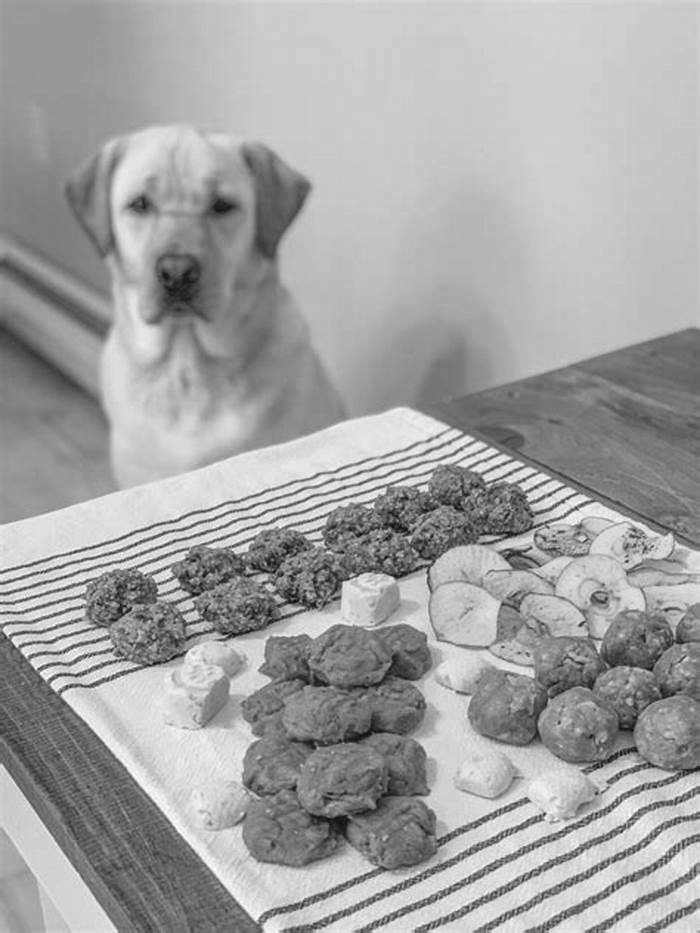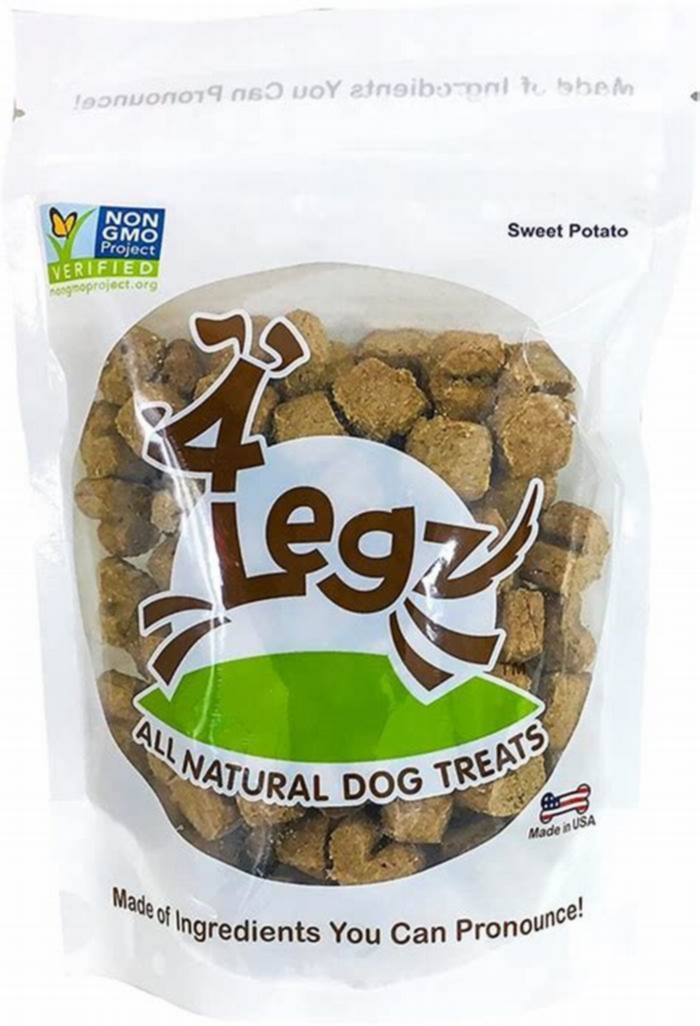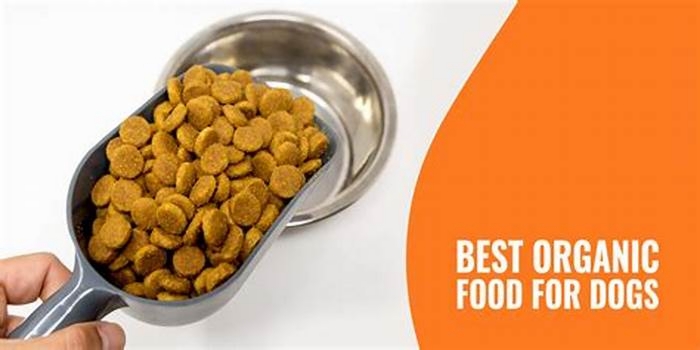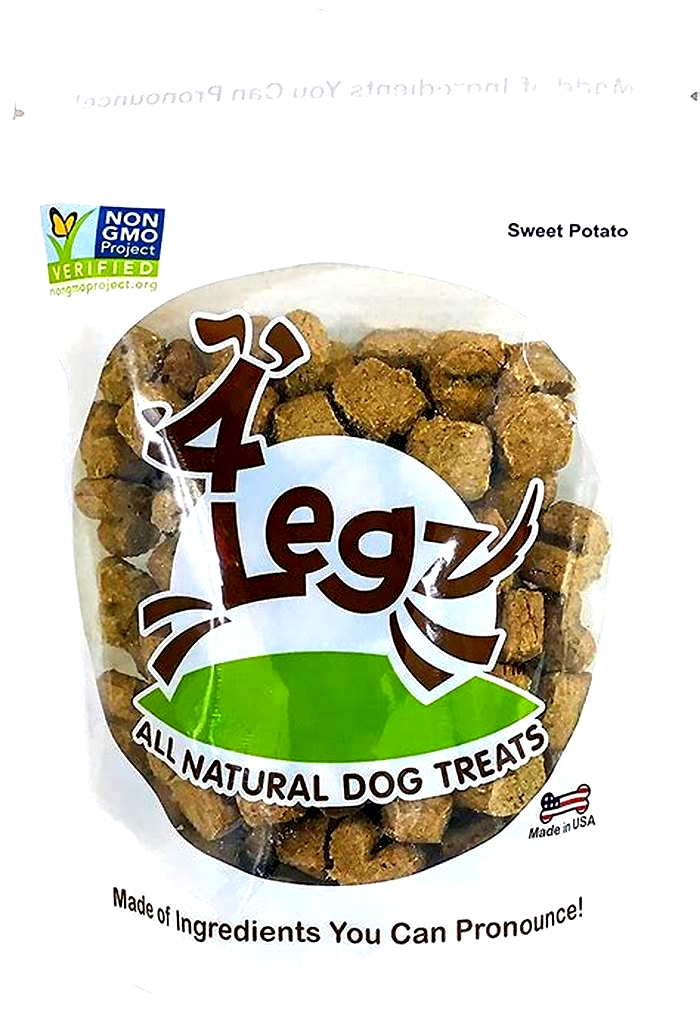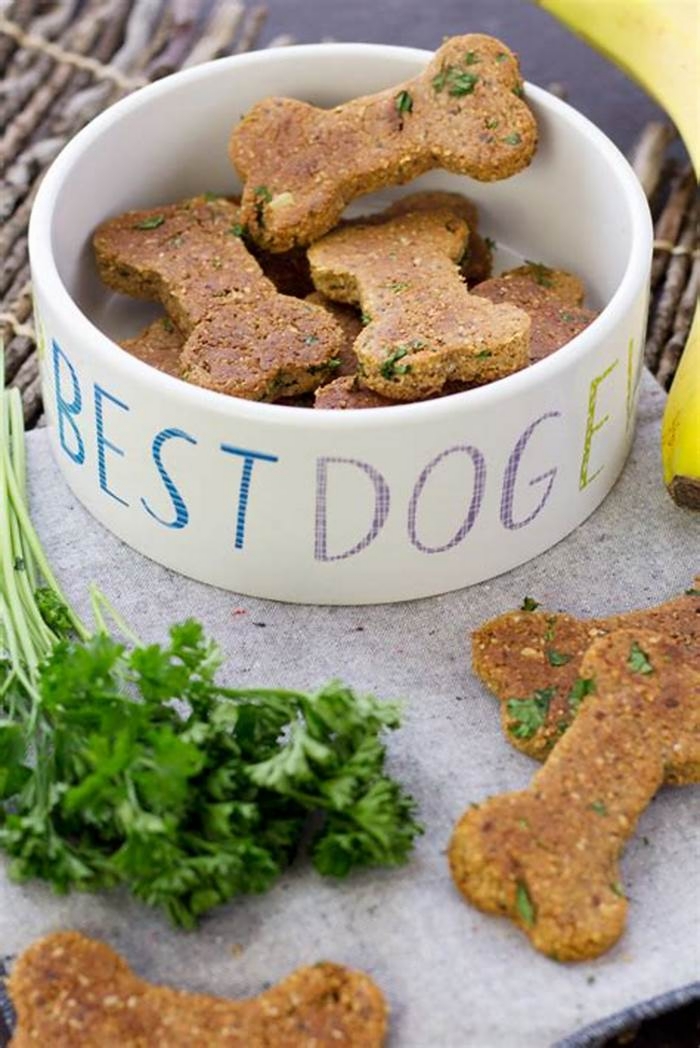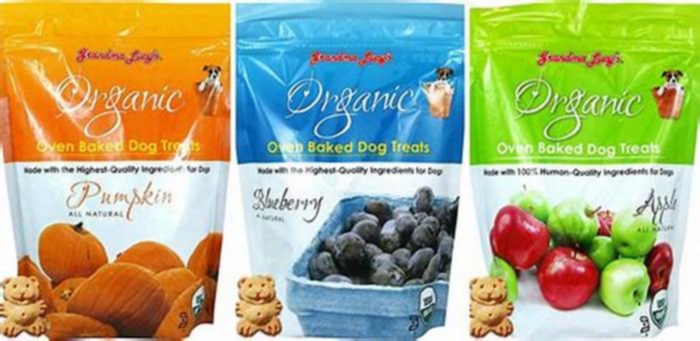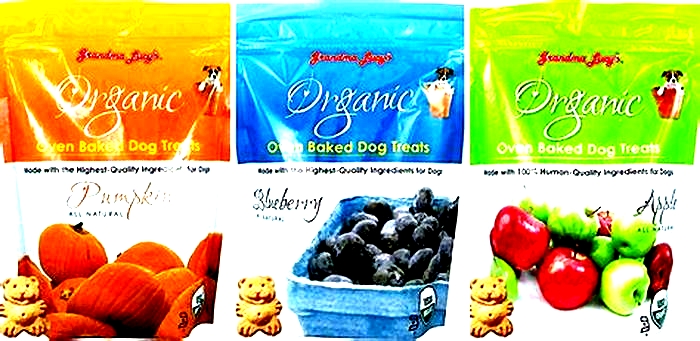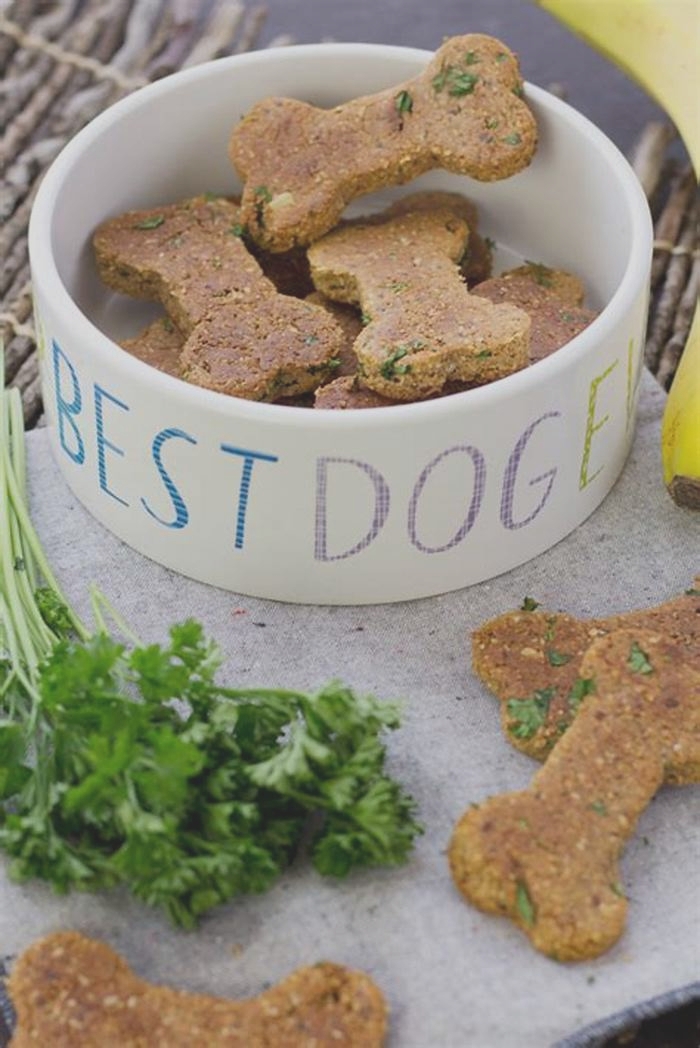Nourishing Nibbles The Joy of Organic Dog Treats
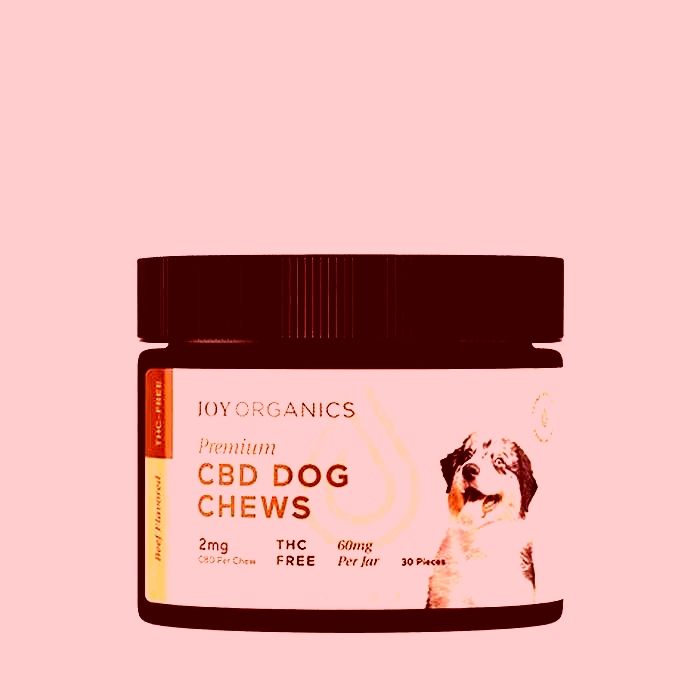
7 Best Organic Dog Treats that Healthy Dogs Love
The Scoop on What to Look for In Dog Treats
Just like you wouldn't feed your human family members junk food all day, you shouldn't do the same with your four-legged kin.
Here are some key considerations to bear in mind when shopping for dog treats:
- Organic Ingredients: These are free of pesticides and GMOs, which means they're healthier for your pet and the planet.
- Protein-Rich: Protein is a crucial part of your dog's diet. Look for treats that list a quality source of protein as the first ingredient.
- Made In The USA: Opt for treats made in the good ol' US of A to ensure quality and safety. American-made products tend to have stricter manufacturing standards than cheaper imports from countries with slacker standards.
- Texture & Flavor: Popular flavor choices include peanut butter, sweet potato, pumpkin, chicken, and beef. Crunchy treats are great for teeth and gum care. Soft treats are easier to break apart (making them suitable for training or managing calorie intake).
- Allergies: If your pet has food allergies, you want to take special care when choosing treats. Look for hypoallergenic options containing limited ingredients or specifically formulated for sensitive tummies.
- Product Recalls: Occasionally, pet treats are recalled due to potential contamination or other issues. Be sure to look for up-to-date info on the FDA website and other trusted sources to stay informed.
Unleashing the Truth: What to Avoid in Dog Treats
Unfortunately, not all dog treats are created equal. Here are a few things to steer clear of.
Artificial Additives
Synthetic colors, flavors, and preservatives? No, thank you!These can lead to allergies, digestive problems, and other health issues in dogs.
Some of the nasties you need to avoid include:
- Melamine & Yanuric Acid: First found in some pet food and treats in 2007, these industrial chemicals can cause kidney failure
- Butylated Hydroxyanisole (BHA): BHA is used as a preservative, and studies have reported it might cause cancer in humans and animals
- Butylated Hydroxytoluene (BHT): BHT is also used as a preservative, and some studies suggest it might be linked to behavioral changes, liver problems, and other health issues in some animals
- Dicalcium Phosphate: Could lead to serious calcium deficiencies in dogs
- Propylene Glycol: Can cause anemia and neurological damage in pets
- Sodium Metabisulfite: This preservative has been linked to gastrointestinal problems in dogs
- Titanium Dioxide: This additive can irritate the respiratory system in animals and humans
- Glycerin: Can lead to digestive issues in dogs, such as diarrhea or vomiting
Preservatives play a vital role in preventing food spoilage. If you prefer a non-toxic alternative, choose treats naturally preserved with vitamin E (mixed tocopherols), vitamin C (ascorbic acid), or plant extracts.
However, remember that naturally preserved food may have a shorter lifespan, so checking the expiry dates and being careful when bulk buying is essential.
By-Product Meals
This is often code for low-quality meat.
Stick with treats that list a specific type of meat as the primary ingredient.
Sugar & Salt
Like their human counterparts, dogs can develop health issues from consuming too much sugar or salt.
Watch for brands trying to sneak too much unnecessary sugar and salt into your dog's treats.
DIY Dog Treats: For the Martha Stewarts of Pet Parents
If you're feeling adventurous (or want to save a few bucks), why not whip up some homemade treats?
It's easier than you think, and you'll know exactly what's going into your pup's snacks.
Plus, it's a fun activity that lets you bond with your fur baby.
Are you looking for recipe inspiration? Check out this video for three ideas to get you started. Swap out any non-organic ingredients for organic ones as and when required.
I also like to put any off-cuts of dog-friendly fruits and vegetables in the freezer for Millie to snack on. Saving waste and getting quality nutrition into her. Win-Win!
USDA Organic vs. Made with Organic Ingredients
You've probably seen the terms' USDA Organic' and 'Made With Organic Ingredients,' but do you know what they mean?
'USDA Organic' treats are made with ingredients that have been certified organic by the US Department of Agriculture (USDA). When a product bears the USDA label, it signifies that it's made up of a minimum of 95% organic content, with the remaining components meeting FDA safety standards.
'Made With Organic Ingredients'treats are made with organic produce, but you don't have any third-party guarantees that the manufacturer's claims are valid. This can lead togreenwashing if you're not careful.
So, while both are better than non-organic options, USDA is the gold standard.
Some Other Options to Consider
If you've read this far, chances are you prioritize the overall quality and healthiness of the treats you choose.
However, many reputable and sustainable treat brands can not afford to be USDA-certified due to the associated costs. However, this does not mean that non-certified options are bad.
Besides seeking organic options, there are other vital factors to consider when selecting the ideal treat for your beloved furry friend.
Human Grade
Dog treats labeled as 'human grade' are crafted to meet the highest standards of safety and edibility afforded to products for human consumption.
By adhering to the same stringent regulations as human food, these treats undergo meticulous processing, manufacturing, inspection, and packaging processes.
No Fillers
Fillers in pet treats are ingredients that offer little to no nutritional value.
When it comes to dog treats, typical examples of fillers include corn, soy, rice, and wheat.
Opting for treats that have minimal (or even zero) fillers allows you to provide your pup with a more biologically appropriate and nourishing snack.
GAP Certified
GAP-certified pet treats ensure that the ingredients are sourced from animals raised without antibiotics or added hormones and fed a vegetarian diet.
When choosing GAP-certified treats, you support vital animal welfare initiatives worldwide.
Non-GMO
Non-GMO dog treats and food products are free from genetically modified ingredients created in a laboratory.
Due to the limited scientific knowledge regarding the potential long-term health effects of consuming genetically modified food for both animals and humans, many dog owners choose to purchase non-GMO treats to help avoid potential food sensitivities.
MSC Certified
When purchasing treats that include fish, it's a good idea to keep an eye out for the MSC certification.
This certification ensures that the treat contains fish caught using environmentally sustainable fishing practices, as verified by theMarine Stewardship Council (MSC).
Sustainable Sourcing and Ethical Manufacturing
With the ever-growing environmental crisis, conscientious sourcing and thoughtful production methods are more crucial than ever.
Buying from Certified B Corporations gives additional peace of mind that these businesses adhere to rigorous standards of accountability and transparency.
More Tips for Shopping for Healthy Dog Treats
- Choose grain-free treats if your dog has sensitivities to grains or gluten.
- Consider treats specifically tailored for puppies, seniors, or overweight dogs.
- If your dog loves to chew, choose treats that will last longer and help exercise the jaw muscles.
- If you're unsure which treats to buy, talk to your veterinarian for advice on healthy options for your pet based on their age and individual needs.
- When buying in-store, check the expiration date to ensure you get the freshest treats for your pup.
- Just like us, dogs appreciate variety. Rotating the types of treats you give can keep your dog interested and provide various nutrients. Mix it up. One week, dog cookies. The following week, jerky treats.
Other Sustainable Ways to Treat Your Four-Legged Friend
Why stop at treats? Your faithful hound deserves to be treated in all aspects of its life.
Some of my other favorite ways to treat Millie include:
- A super soft, squishy, and sustainable dog bed offers a healthy and comfortable sleep every time
- Boredom-busting chemical-free dog toys keep all dogs entertained
- Rip-proof eco-friendly dog poop bags (more of a treat for the owners and the planet to be fair)
- Minty Fresh organic dog toothpaste (you might appreciate it more than they do)
- Sustainable dog food for a guaranteed clean bowl (and a clean eco-conscience)
- A sassy, smart, and sustainable dog collar (for an added touch of style)
What is the healthiest treat for a dog?
Treats with the fewest ingredients (and no added nasties) are the healthiest for your dog.
Consider making your own if you want 100% control over what goes into your dog's treats. It's essential to avoid artificial sweeteners, such as xylitol, as they can be toxic to dogs.
Who are the Association of American Feed Control Officials?
The Association of American Feed Control Officials (AAFCO) is a reputable non-profit organization that establishes and upholds standards for animal feeds and pet foods in the US.
What foods are poisonous to dogs?
The Humane Society of the United States (HSUS) has published a comprehensive list of foods and plants poisonous to dogs.
Is rawhide a safe treat for my dog?
Many dogs favor rawhide chews, but it's crucial to be aware of their potential health hazards. Rawhide undergoes extensive processing, which can lead to challenges in digestion and increase the risk of choking or intestinal blockage.
If you buy rawhide chews, ensure they're sourced from reputable suppliers and manufactured without harmful chemicals.
Are raw bones safe for my dog?
Raw bones can be safe, but you must be careful. It's vital to select fresh raw bones (to avoid the risk of listeria, e. coli, and salmonella) that are appropriate for the size and health of your dog.
Your veterinarian may be able to provide guidance on which types of bones are safe for your pet. You should always supervise your pet while they're enjoying a bone treat to ensure they don't choke or swallow pieces that are too large.
How many treats can I give my dog?
Treats should make up no more than 10% of your dog's daily caloric intake. Use a calorie calculator if you're unsure what your dog's intake should be.
Is peanut butter bad for dogs?
In moderation, peanut butter can be an excellent treat for your pup. It's high in protein and has health benefits, such as promoting joint health, aiding digestion, and helping to reduce tartar buildup on teeth.
However, some peanut butter contains xylitol, so you should always read the label before feeding it to your dog.
Why do organic dog treats cost more?
Organic dog treats cost more because they're made with higher-quality ingredients and are often produced in smaller batches. Additionally, organic production is often certified by third parties, adding to the cost.
What treats do vets recommend?
Veterinarians usually recommend treats that are low in added sugar and salt, high in protein, and free of artificial ingredients.
A few years ago, Millie's vet recommended that we freeze chunks of cucumber for a nice cooling summer snack. This was a top tip. Millie loves them!
Are Blue Buffalo treats good for dogs?
Blue Buffalo is not a brand I tested for this article. However, they appear to have some good natural options onAmazon. I've added it to the testing list for the next update of this article.
Pop your details on ourmailing list to get update notifications.
The Final Word
Organic treats offer a fantastic means of nourishing your beloved pet with healthy and natural nutrition.
There are numerous compelling reasons to choose organic treats, including:
- Organic ingredients are sourced from farms that don't use pesticides or synthetic fertilizers, making them safer for your pup
- Organic ingredients are free from genetically modified organisms (GMOs), which means they haven't been altered in a lab
- Organic food is often healthier, as it can contain higher levels of nutrients like vitamins and minerals
- Organic treats contain natural preservatives
- Organically sourced foods are better for the environment since they don't contribute to the overuse of pesticides or synthetic fertilizers
- Organic treats are also often produced in smaller batches, which means that they are fresher when they reach your pet
- Many pet owners report that their pets enjoy the taste and texture of organic treats more than traditional options (although taste is very subjective)
With all these benefits, it's no wonder so many pet owners are turning to organic dog treats!
Get In Touch
Do you only buy organic dog treats? Or are you happy with the quality that non-organic treats offer? Have you ever tried to make your own? Drop me a line and let me know.
The 12 best organic dog treats of 2023, approved by vets
When you buy through our links, Business Insider may earn an affiliate commission. Learn more
Organic food isn't just for people. In recent years, pet food companies have been rolling out organic grub, including some of the best organic dog treats. That may be in response to consumer demand, especially as people become more environmentally conscious, something a report from Future Markets Insights notes.
But there's something more that may be fueling interest in organic treats for dogs. According to Dr. Nancy Welborn, associate professor and service chief of community practice at the Louisiana State University School of Veterinary Medicine, consumers who assume that organic food is safer or more nutritious may seek out these treats.
The question is, though, do these treats, which are often pricier, have a nutritional edge over their conventional counterparts? It's possible. "Organic foods have been shown to have small increases in nutrients like omega-3 fatty acids and antioxidants when compared with their non-organic counterparts," says Dr. Kasey Aona, medical director and owner of GoodVets in Columbus, Ohio. "That said, though, there haven't been any studies to prove the nutritional benefits of feeding organic treats over non-organic ones in dogs."
Although there are fewer organic than conventional dog treats, the options are growing. To help you narrow down the best organic dog treats, we looked at dozens of brands and flavors and made our picks based on the criteria veterinarians shared.

